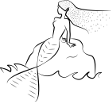General info
Date: July 29th to August 2nd 2019
Place: Copenhagen Denmark
Organized by: The Department of Biology, University of Copenhagen (Fernando Racimo, Anders Albrechtsen and Ida Moltke)
Price: Free for all PhD students at Danish universities. 200 USD for all other students.
Includes: All teaching. Food and accommodation are NOT included in the course fee.
Contact and sign up: The course is full so sign up is no longer possible! For questions write cphsummercourse@gmail.com
Content
The course is a comprehensive introduction to a number of topics and common research tools used in analyses of next-generation sequencing (NGS) data. Topics include: genetic drift, natural selection, population structure, association mapping, GWAS, spatial genetics, f-statistics and demographic inference. The main focus will be on humans, but the methods we will cover are applicable to many other species as well. Lectures will be combined with hands-on computer exercises, mostly using R and command-line based programs.
Intended Learning Outcome
After the course the student should be able to:
- Use population genetic theory to infer basic population genetics characteristics from genetic data, including Fst, population size, relatedness and linkage disequilibrium
- Be able to infer ancestry and population structure based on genetic data
- Use NGS data including low depth for population genetic inference.
- Select the optimal strategy for disease mapping based on the available data, the trait of interest, and the population genetics characteristics of the sample population, including taking population structure into account
- Interpret and discuss the results of own analyses and results in the scientific literature
Instructors
- Matteo Fumagalli Imperial College London, UK
- Benjamin Peter Max Planck in Leipzig, Germany
- Kelley Harris UW, USA
- Line Skotte Statens Serum Institut, Denmark
- Fernando Racimo Globe Institute, University of Copenhagen, Denmark
- Anders Albrechtsen Department of Biology, University of Copenhagen, Denmark
- Ida Moltke Department of Biology, University of Copenhagen, Denmark
Time and place
The course will take place from Juli 29th to August 2nd 2019 at Biocenteret, Ole Maaloes Vej 5, 2200 Copenhagen N. All lectures and computer exercises will take place in room 4.0.24 (i.e. building 4, ground floor, room number 24). All research talks will take place in room 1.2.03 (i.e. building 1, second floor, room number 3). NB. The main entrance to the Biocenter is likely locked during the first three days of the course (until the end of July). Instead you should be able to enter using the back entrance shown on this map. Notice that to get to the back entrance you need reach the building from a different street (Jagtvej).
Laptop
You should bring a laptop to the course. We will log into a remote server from the laptop so any laptop will do regardless of operating system. However, please, if at all possible, make sure your computer can be connected to wired internet.
Course material
The lecture will be based on a large amount of reading material (articles/notes) that should be read in advance - you can find them here once they are finalized (you will get an email with password). The slides used during the lectures will be made available right before the lectures.
Program
Monday - Introduction to population genetics and NGS data
- 09:00 - 09:15 Welcome
- 09:15 - 10:15 Lecture 1: Introduction to basic population genetic terms and concepts (Fernando Racimo)
- 10:30 - 12:00 Computer exercises I
- 12:00 - 01:00 Lunch (on your own)
- 01:00 - 02:15 Lecture 2: Introduction to basic NGS data, Data processing, and formats (Anders Albrechtsen)
- 02:30 - 03:15 Computer exercises II
- 03:30 - 04:15 Research lecture by Cosimo Posth, Max Planck, Jena. Title: "Upper Paleolithic genomic history across European geo-temporal transects"
- 04:30 - 07:00 Reception/social mixer
Tuesday - Analysis of NGS data and population structure
- 09:00 - 10:15 Lecture 3: Estimation of allele frequencies, SNP calling and genotype calling from NGS data (Matteo Fumagalli)
- 10:30 - 12:00 Computer exercises III
- 12:00 - 01:00 Lunch (on your own)
- 01:00 - 02:15 Lecture 4: Inference of population structure (Anders Albrechtsen/Ida Moltke)
- 02:30 - 04:00 Computer exercises IV
- 04:15 - 05:00 Research lecture by Benjamin Peter, Max Planck, Leipzig. Title: "Fine-scale timing of hominin gene flow"
Wednesday - Inference of demographic history
- 09:00 - 10:15 Lecture 5: D/f/F statistics (Ben Peter)
- 10:30 - 12:00 Computer exercises V
- 12:00 - 01:00 Lunch (on your own)
- 01:00 - 02:15 Lecture 6: Demographic inference (Kelley Harris)
- 02:30 - 04:00 Computer exercises VI
- 04:15 - 05:00 Research lecture by Matteo Fumagalli, Imperial College London, UK. Title: "Diet-driven balancing selection: from cell biology to deep learning"
Thursday – Demography and selection
- 09:00 - 10:15 Lecture 7: Admixture graphs and spatial methods (Ben Peter)
- 10:30 - 12:00 Computer exercises VII
- 12:00 - 01:00 Lunch (on your own)
- 01:00 - 02:15 Lecture 8: Selection scans
- 02:30 - 04:00 Computer exercises VIII
- 04:15 - 05:00 Research lecture by Kelley Harris, UW, USA. Title: “Evolution of the mutation rate and spectrum in diverging great ape populations.".
Friday - Disease mapping and selection
- 09:00 - 10:15 Lecture 9: Association mapping I. Basic association mapping (Line Skotte)
- 10:30 - 12:00 Computer exercises IX
- 12:00 - 01:00 Lunch (on your own)
- 01:00 - 02:15 Lecture 10: Association II: advanced association testing and selection (Anders Albrechtsen/Fernando Racimo)
- 02:30 - 04:00 Computer exercises X
- 04:15 - 05:00 Research lecture by Thomas Folkmann Hansen, Region Hovedstadens Psykiatri, Denmark. Title: "Genomic Era of psychiatric disorders"
- 05:00 - ? Farewell drinks
Evaluation
Participants who have participated actively in all parts of the course and completed all exercises satisfactorily will be awarded a certificate of completion at the end of the course. The work load corresponds to 5 ECTS points. Note that this workload includes one week of preparation. Reading material for this is available in the above course program.
